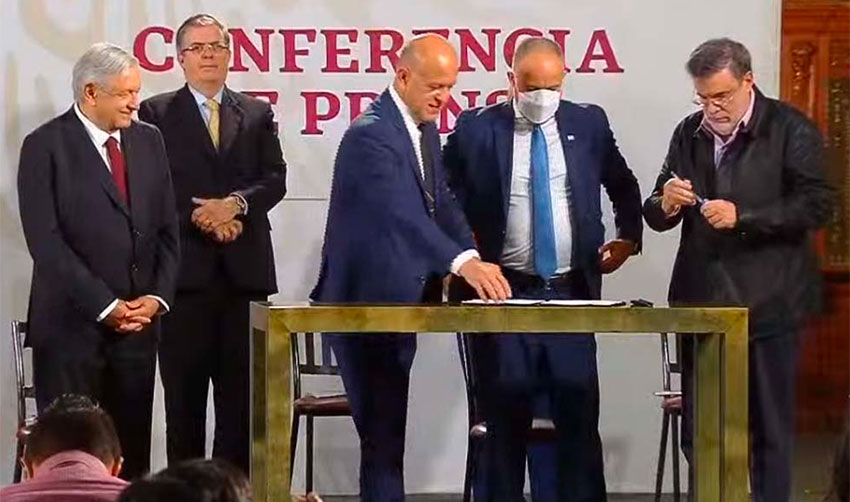A government that has declared corruption as Public Enemy No. 1 might be expected to make a great effort to ensure that procurement practices are designed to minimize the opportunities for officials to engage in corrupt practices.
But the administration of President López Obrador appears unworried that the purchase of supplies and awarding of contracts is less transparent than it was under the previous government of Enrique Peña Nieto.
Federal government departments and state-owned companies can make purchases and award contracts via three different processes: open tendering, a competitive public procurement method in which companies are invited to submit bids; invitation-only tendering, a process in which only a limited number of selected companies are asked to submit bids; and direct adjudication, a procurement process in which officials make purchases or award contracts without seeking any bids.
In 2019, the first full year of President López Obrador’s government, the state oil company Pemex made far greater use of invitation-only tendering to purchase goods and services from outside contractors than it did in 2018, the final year of Peña Nieto’s presidency. More on that later.
Now, the federal Congress has passed a legal reform that will allow the government to purchase medicines and medical supplies abroad using the direct adjudication procurement method.

Congress passed the reform even though the Constitution establishes that the government should favor the use of open tendering in order to ensure that the prices it pays are fair and the goods and services it receives are of high quality.
The law change was praised by President López Obrador and led to an agreement between the federal government and the United Nations Office for Project Services (UNOPS) to collaborate on the international purchase of medicines, medical supplies and vaccines.
But anti-corruption campaigners have condemned the move to make such purchases abroad without an open tendering process.
The National Network of Citizens Participation Committees, an organization that is part of the government’s National Anti-corruption System, called for the reform to be revoked.
The network said in a statement that the direct adjudication faculty in the reform is “highly discretional” and has “no limit.”
It said the government will be able to purchase medicines directly at any time, even in the absence of a health emergency such as the coronavirus pandemic.
The citizens’ network, made up of people known for their efforts to make government more accountable and transparent, said the changes to the Acquisitions Law that Congress passed last week will make government spending less transparent and as a result more prone to corruption. It also said the law change will have an adverse impact on competition.
In addition, the absence of open tendering will mean that citizens will not know whether the government had an available option to purchase higher quality or cheaper medicines and medical supplies, the network said.
The citizens’ committees called on lawmakers and others to launch legal action against the reform and expressed confidence that they would.
“We’re confident that legislators who oppose this reform, as well as the Federal Economic Competition Commission and the National Institute for Transparency and Access to Information [INAI], will present the legal recourses conducive to the judicial power guaranteeing … transparency and competition in the awarding of public contracts.”
Another critic of the reform is the general director of Mexican Transparency, a chapter of Transparency International, a global coalition against corruption.
Eduardo Bohórquez told the newspaper El Economista that purchasing medications abroad via direct adjudication will result in greater government opacity. He said the Acquisitions Law reform allows the government to deposit resources in a fund over which the Federal Auditor’s Office and the Ministry of Public Administration – which serves as the government’s internal corruption watchdog – will have no jurisdiction.

“A fund that is not able to be overseen by the Mexican state is a risk, … it’s a kind of outsourcing for the purchase of medicines,” Bohórquez said, referring to the partnership with the UNOPS.
“Mexico loses sovereign power and the second issue is transparency. An international organization is not subject to Mexico’s Transparency Law,” he said.
Bohórquez said that UNOPS regulations might be transparent by international standards but “our analysis is that they are below those of Mexico.”
INAI will have no jurisdiction over the medical purchases the government makes abroad, he added.
This means that the direct purchase of medicines in foreign countries via the collaboration with the UNOPS could create a fertile breeding ground for corruption even though López Obrador says it will put an end to the malfeasance that has plagued such purchases.
Pemex’s recent increase in spending on contracts awarded via invitation-only tenders shows that there is a broader shift away from open tendering even though the Mexican Constitution encourages the government to make wide use of that process.
An INAI study found that 40.6% of the funds Pemex spent last year on goods and services was paid to companies that won contracts via invitation-only tendering. By contrast, spending on invitation-only contracts in 2018 accounted for just 0.8% of the state oil company’s total outlay on goods and services.
Total spending on those contracts in 2019 was 72.8 billion pesos (US $3.2 billion at today’s exchange rate), with a large part of the money used to hire contractors to work on Pemex’s new refinery on the Tabasco coast. The government has justified its use of invitation-only tendering by saying that it allows the process to be completed more quickly, allowing the refinery to be completed sooner.
However, it doesn’t take away from the fact that the state oil company’s spending on open tendering contracts fell to 42% – 75 billion pesos – of total expenditure in López Obrador’s first full year in office compared to 67.7% in 2018.
One positive sign, anti-corruption campaigners would likely argue, is that Pemex’s direct adjudication spending fell to 17.4% – 31 billion pesos – of total expenditure on contracts last year compared to 31.5% in the final year of the Peña Nieto administration.
It is also worth noting that the heavily indebted state oil company spent more than double on outside contracts in 2019 than it did in 2018. Spending totaled 179.3 billion pesos last year (US $7.9 billion) while the outlay in 2018 was 85.8 billion.
The main factor in the much higher spending is the government’s decision to build the new refinery, a move that has been criticized by many analysts who say that it will divert funds from Pemex’s more profitable exploration business.
The question now is: are those funds being spent wisely and honestly? Mexicans will have to rely “on the president’s word,” as Reforma columnist Miguel de la Vega wrote on Tuesday, and his “self-proclaimed moral superiority to sanctify what anywhere else would raise all kinds of suspicion.”
Mexico News Daily